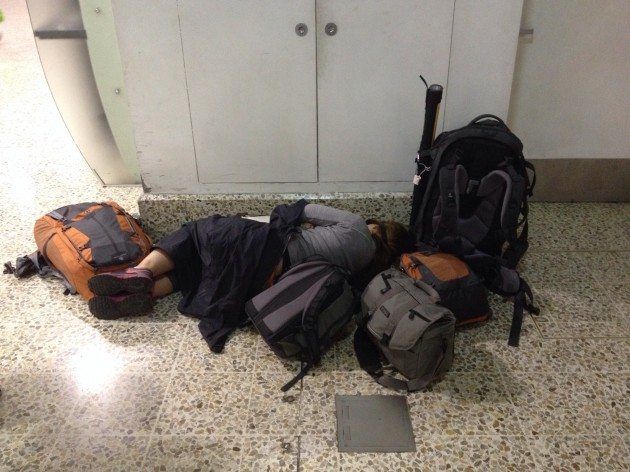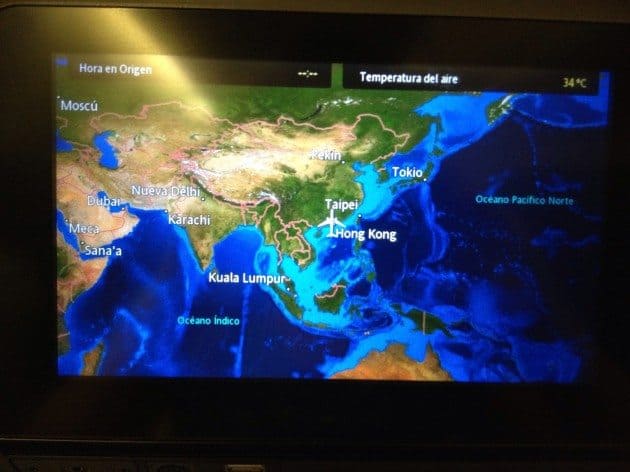After spending over 200 days on the other side of the World, traveling to remote locations looking for our next adventure, we decided to make a surprise visit home to Wisconsin. This adventure home sent us across 13 time zones and took 24 long hours.
Hong Kong to Dallas to Minneapolis by plane, then to Minneapolis to South Range, WI by car. We have made this large jump of time zones before but not after spending 200 days on the other side of the earth.
One full day later, we finally arrived home. It was late at night and we could not wait to surprise everyone early the next morning. We quickly got six hours or sleep and rushed over to Lina’s parent’s house to surprise them.
Everyone was surprised and even blown away, but it was all we could do to fight off the afternoon nap (which was an unsuccessful endeavor) to begin the task of resetting our internal clocks to central standard time.
We ask ourselves why we got 6 hours of good sleep in a bed we have missed for 200 days. The answer is simply, we were affected by Jet Lag.
How to Get Over Jet Lag: A Survival Guide
What is Jet Lag and How Can it Affect you?
Jet Lag is tiredness and other physical effects felt by a person after a long flight across several time zones. All people are affected by jet lag differently but common symptoms generally include:
Fatigue and Disorientation: Being tired and disoriented for days after arriving. Feeling a lack of motivation for any activity that requires some effort of skill like driving, reading or even working. (For us working on our blog)
Interrupted sleep: Crossing time zones can cause you to wake up during the night (for me it was at 3-4 AM) or make it difficult to fall to sleep. You then end up feeling sleepy during the day and end up taking naps. (For Lina it was 3 hour naps around 2pm) NASA estimates that you’ll need one day for every one hour time zone you cross to get back to your normal rhythm. For us that means in 13 days we should be readjusted to central standard time.
Confusion and Fuzziness: Forgetting to do a basic task or maybe checking two or three times to see if you have completed that task. Also zoning out when people are trying to talk to you.
Mood: Jet lag can affect your mood causing you to have mood swings from one minute to the next. Some people experience a full spectrum from happy to mad to sad all in a short period of time. Luckily, this is short lived and easily slept off with a nap.
Dehydration: The dry air aboard the aircraft can dry out your skin, give you headaches and irritate your lungs and nostrils. This can make you more susceptible to any colds, coughs, sore throats and flu that may be blowing around the aircraft.
Jet lag has been directly linked to problems like diarrhea caused by microbes contamination in your water or food affecting about 50% of long distance travelers.
Factors like travel fatigue, jet lag, changes in your diet, different climates, and lowered immunity will aggravate the problem by lowering your resistance and making you more susceptible to infections.
How Can You Prevent Jet Lag?
A few basic steps may help prevent jet lag or reduce its effects:
-
-
- Arrive early
- Get plenty of rest before your trip
- Gradually adjust your schedule before you leave
- Regulate bright light exposure
- Stay on your new schedule
- Stay hydrated
- Try to sleep on the plane if it’s nighttime at your destination
- Take pills that help prevent jet lag
- Some people believe even pulling off your socks and walking barefoot on the grass or sand helps
-
I’ve always believed that my body adjusted quickly to new time zones and that I’ve never been affected by jet lag before. Boy was i wrong. Spending 200 days on the other side of the globe has reset my internal clock in ways that shorter trips have never done before.
We’ve been home for 2 weeks and I am just starting to feel adjusted to central standard time. I suppose I will be just about right when the time comes to head towards the Philippines in a month. So is the life of a traveler.
Have you been affected by jet lag before? What prevention or treatments have you taken?
More on Travel Planning:
- How to Plan A Trip: Step by Step Guide
- AirBNB Coupon Code: Up to $100 in Free Promos & Discounts
- 10 Killer Tips on How to Find Cheap Flights
- 11 Easy Tips on How to Find Cheap Accommodation
- How to Save Money for Travel: A Step by Step Plan
- How to Get Free Plane Tickets
- 5 Ways to Survive that Long Layover
- Your Guide For Doing Laundry While Traveling
- 5 Good Reasons to Use a Vacation Planner
- Is Travel Insurance Worth It?
- 10 Reasons to Have Annual Travel Insurance
- How to Choose the Best Travel Insurance Policy
- Travel Insurance for Europe Vacation: Do I Need It?




Hello David Stock,
I read your blog, where you are very well point out the symptoms of leg lag and also given best tips to prevent this problem. But If traveling time we avoid alcohol, then we can also fight with jet lag. Because of alcohol reduced pressure at high altitudes and the reduced ability of the hemoglobin to absorb oxygen which is directly affect our mood.
Yes, that is a great tip too. Do not consume alcohol before, during or after you have crossed many time zones. It can make recovery harder for your system.
I was constantly amazed at how I got over my jet-lag (or more like, how non-existent it was!) when I flew from the UK to NZ, I think then it was a 13 hour-time difference. I was preparing as much as I could by going to bed earlier and earlier and getting up later and later with strict plans when I was allowed to sleep on the planes… And many people kept scaring me with stories how “it may take even a month to get rid of jet-lag…”
All these plans went out the window since I found it practically impossible to sleep during the flights- therefore when I arrived in NZ after 30h of travelling I hadn’t properly slept. The flight arrived in the afternoon, and due to excitement I managed to stay awake till the evening, go to bed at a reasonable time and wake up at around 8.30am. The same happened the way back – though I went to bed at 6pm when I arrived back in the UK, I woke up at 9am the next morning and slipped effortlessly back into my normal time zone!
Rambles aside, it really does depend on the person. And my theory is that since it was a complete opposite time zone and due to sleepless planes, it may even be easier (for me at least!) to adjust to NZ time… But hopefully I’m just a jetlag-natural 😀
Funny that you mention New Zealand, because despite it being one of the longest flights we have been on, we had the easiest time adjusting while there! I think it has to do with the proximity to the international dateline. We arrived at around 11am and had no problem staying up all day and then going to bed at a normal time. We never had one ounce of Jet lag from that leg of travel. It was amazing! The one that always gets us is Asia- China, Hong Kong, Japan, Thailand- get really bad jet lag flying back to America from there every time.
Yes…I went to Japan in June and for the first time, I was hit bad with jet lag….coming and going….it kicked my tail
It always amazes me how bad the Jet lag is coming from Asia to the states. That is the worst one for me! Heading to Asia, still get it but it’s not so bad. Maybe its’ just the excitement of the destination? 🙂